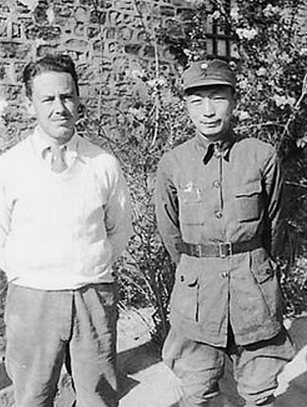
George Hogg with Nie Rongzhen, General in the Chinese Communist Army, c.1943. A similar photo is on the cover of “Ocean Devil” by James McManus, 2008 – Peter Chin – from archives
During his state visit to the UK, President Xi mentioned George Hogg during his speech at the Queen’s banquet on 20 October 2015 – an important event of his visit. He said that the Chinese People will never forget those brave British who came to China to help and to fight with the Chinese against the Japanese during the war. He specially mentioned George Hogg, highlighting the story of a British journalist and schoolteacher, who reported on “the atrocities committed by the Japanese” in his reports and books about China and the War, such as I see a new China (1944). The President mentioned Hogg’s service as a teacher, then headmaster of the Bailie School in Shuangshihpu Township, Baoji City, in Shaanxi Province. A short report of the President’s speech is included in The Guardian on-line for 20 October – http://www.theguardian.com/world/2015/oct/20/chinese-president-begins-uk-state-visit-show-strength-xi-jinping-speech-parliament-queen – but did not appear in the print edition.
George Hogg and St George’s School

David Waters, Head of History, St George’s School, with photo of George Hogg and sick pupil, in the School archives.
In early September The Times newspaper published a supplement from Xinhua News Agency dated 4 September 2015, which included an interview with David Waters, Head of History at St George’s School. George Hogg had attended the school from 1927 to 1934, before studying at Oxford, and then setting off on a round-the-world trip in 1937, and arriving in China just before the outbreak of war. He set to work as a free-lance journalist, sending reports to The Manchester Guardian and The New Statesman. Click on the link for a summary of George Hogg’s work in Shaanxi and Gansu provinces. Hogg’s story is a popular subject of study for students at St George’s where his name is engraved on a wall of the Old Library.
Speaking to the Xinhua in August 2015, David Waters told the reporter: “Much of Hogg’s history is relevant today. I think most pupils are inspired by his sacrifices. China was in a difficult period, and he decided to give all for the Chinese people. Because he is a local person, I think he is more inspiring. He is local history. It gives you a sense of where you live and it shows today’s students what they can do as individuals”.
St George’s School uses George Hogg’s experiences to explore the Second World War from a different perspective: “We look at what happened in China through the stories of George Hogg. For example we look at events in Nanjing [when hundreds of thousands of Chinese were massacred by the Japanese]. It helps to illuminate the global nature of the Second World War and allows students to understand the war in much more depth.”
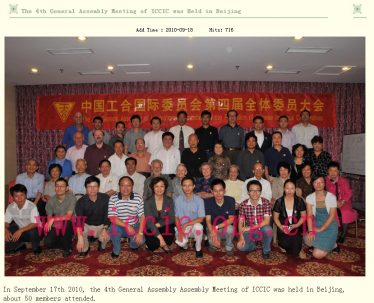
The 4th General Assembly of ICICC* in Beijing, 2010 – The Nie Brothers are on the left of the second row. *International Committee for Promotion of Chinese Industrial Co-operatives – Gungho. – Peter Chin – from archives
School trips to China
Pupils from St George’s take part in trips to China, including a trip in 2008 to the town to which Hogg’s school was evacuated in Shandan, Ganzu Province in the far west. St George’s school hosted the Nie Brothers (two of George Hogg’s adopted sons) and relatives of the Hogg family in 2010.
In 2012, the School hosted an education event for pupils and Harpenden residents, sponsored by the Co-operative Group. Jenny Clegg of the Society for Anglo Chinese Understanding (SACU), spoke of the pre-war Gung Ho Co-operative movement and its involvement in the Co-operative Bailie schools, such as the school in Shuangshihpu, in Fengxian County, Baoji City, Shaanxi Provience, where George Hogg taught from 1942. From here he led the pupils to safety in Shandan, Ganzu Province, as dramatically recounted in the 2008 film The Children of Huang Shi, which has never been on general release in the UK. The planned School visit to Shandan in 2013 was aborted due to the earthquake in that part of China, though Nie Guangtao was able to meet them in Beijing. However in October 2013 Jenny Clegg led a tour of places associated with Joseph Needham and George Hogg – see http://www.sacu.org/georgehogg.html.
Celebration of Hogg’s centenary in China
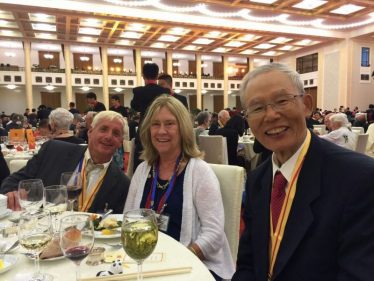
The Nie Brothers at the Beijing celebration, 3 September 2015 – Peter Chin 2015
While George Hogg’s centenary has been very low-key in the UK, his contribution to China’s Anti-Japanese war was recognised in the celebrations in Beijing on 3 September 2015. The Nie Brothers were invited to the march and reception, but unfortunately attempts to contact and invite representatives from St George’s School did not reach England in time. Recently the China Xinhua News Press published a book named the Anti Japanese War of Our Parents, in which they selected one article by Nie Guangtao, introducing George Hogg as his adoptive father.
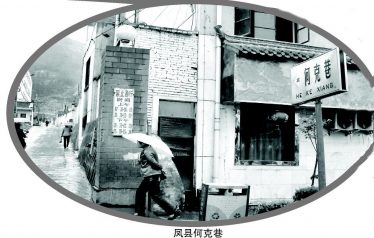
Hogg Lane, Shuangshipu, Xian Province – Peter Chin – from archives
Peter Chin, Director of the International Exchange Center, Xian Peihua University, is from Xian, the capital city of Shaanxi Province. In 2007 he became aware of George Hogg’s legacy and visited Shuangshihpu, a township in Fengxian. This is where George Hogg started to work for the Bailie School for two years before he and the kids made the long and difficult journey to Shandan in 1944. Peter Chin visited the remains and site of the township and saw the house where Rewi Alley and Hogg lived, now rebuilt as a small museum. There is a narrow street named Hogg Lane in the township even today.
Peter is finding reports of President Xi’s Speech at the Queen’s Banquet in the Chinese press. “I learnt of good news from Beijing: the HQ of Chinese People’s Friendship Association are doing something there. People are visiting Shandan, where George was buried and where his monument stands. On 2 December 2015 the local university in Lanzhou, Gansu Province, are planning a meeting as well as the launch of Rewi Alley Study Center (including George Hogg’s contribution) in Shandan, where the original Bailie School was set up after being evacuated from Shuangshihpu.
“The local government in Fengxian, Baoji, was also excited about it and they announced a big decision to build up a museum on a 2 hectare site, around Rewi Alley’s and George’s former Residence museum. They say the investment will be in the region of 70 Million Chinese Yuan!

Rewi Alley and George Hogg Residence Museum, Shuangshipu – Peter Chin 2015

Rewi Alley with adopted war orphans – Xinhua file photo – from supplement published in The Times, 4 Sept. 2015
Seminar on George Hogg – November 2015
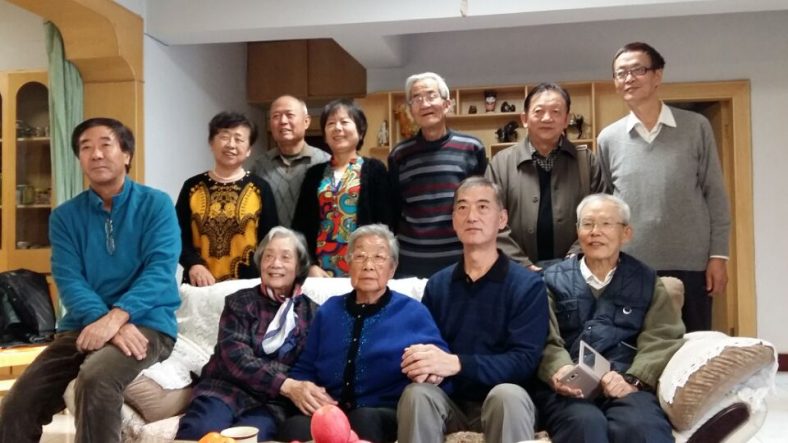
Celebrating George Hogg and the Gung Ho movement in Fengxian on 30 November 2015. The lady in the middle of the front row is the widow of the former principal of the Bailie School in the early 50s, 91 years old. And lady next to her was the former secretary of Rewi Alley and she is 85 years old. On the right hand end of the front row is the third of George Hogg’s adopted sons, Nie Guangtao. He said he is 80 years old. Credit:Zhang Jianhua/Xinhua, August 2015 from supplement published with The Times, 4 Sept.2015
“With sponsorship from my university I have for some months been teaming up with some of my friends in Xian, the Xian Eighth Route Army Office Museum (8th Route Army was part of the Communist Army fight against the Japanese during the War), Shaanxi Translation Association, and others to organize a seminar at the end of November 2015, celebrating the centenary of George Hogg’s birth, and his work for Gung Ho in the province. But, when the people of Fengxian heard about my plan, they are eager to contact me and offer to join us in Xian and even wish to have the seminar in Fengxian. So there is “Hot Fever” surrounding the study of George Hogg. Let’s hope this proves to be a positive outcome.”
Quotations from Peter Chin edited from his emails of 7 November 2015.
* See: http://www.gungho.org.cn/en-index.php for the work of the International Committee of the Promotion of Chinese Industrial Co-operatives.

Comments about this page
The seminar on George Hogg, planned by Peter Chin, has been postponed until February 2016, because of the scale of official celebrations of George Hogg and the Gung Ho movement in Fengxian on 30 November 2015 and in Shandan on 2 December. Peter has sent a photo he took of key people present at the Fengxian celebrations, which includes one of George Hogg’s four adopted sons – Nie Guangtao - and ladies associated with the Bailie school which at Rewi Alley continued the work he and George Hogg had begun. The photo, with a caption to identify the key participants, has been added at the bottom of the main page.
Add a comment about this page